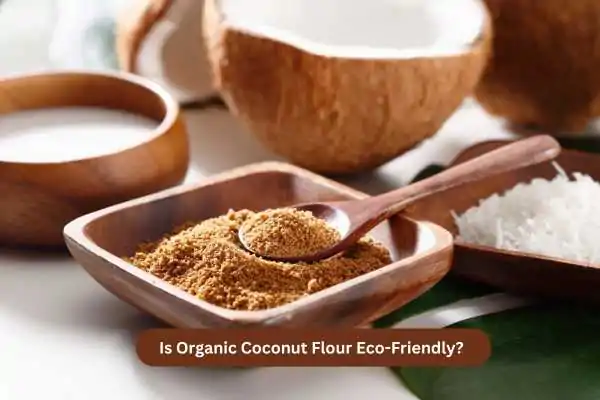Organic coconut flour has become a popular alternative to wheat and other grain-based flours, especially among those following gluten-free or plant-based diets. In the UK, it’s now widely available in supermarkets, health food shops, and online. But beyond its nutritional benefits, many people are asking an important question: Is organic coconut flour eco-friendly?

To answer this, we need to look at how coconut flour is produced, its impact on the environment, and whether choosing it supports a sustainable future.
What Is Organic Coconut Flour?
Coconut flour is a soft, fine powder made from the dried flesh of coconuts. After coconut milk or oil is extracted, the remaining pulp is dried and ground into flour. When labelled as organic, it means the coconuts are grown without synthetic pesticides, fertilisers, or genetically modified organisms.
Because it uses what would otherwise be a by-product of coconut oil or milk production, coconut flour is considered a secondary product—essentially reducing waste. This is often cited as one reason it is seen as environmentally friendly.
The Environmental Benefits of Coconut Flour
1. Utilising By-Products
The production of coconut flour helps prevent food waste. Instead of discarding coconut pulp after oil or milk extraction, it’s repurposed into flour. This efficient use of resources makes it more sustainable compared to flours that require dedicated farming and processing.
2. Organic Farming Practices
Organic coconuts are grown without synthetic chemicals, which reduces soil and water pollution. This also supports healthier ecosystems around coconut plantations, as biodiversity isn’t disrupted by pesticides and fertilisers.
3. Long Shelf Life
Coconut flour has a relatively long shelf life compared to some grain flours, reducing the likelihood of food waste at the consumer level. Less waste means less strain on resources used in production, packaging, and transportation.
Potential Environmental Concerns
While there are eco-friendly aspects of coconut flour, it’s important to consider some of the challenges:
1. Transportation Footprint
Coconuts are not grown in the UK. They primarily come from tropical regions such as the Philippines, Sri Lanka, and Indonesia. Importing coconut products to the UK involves long-distance shipping, which adds to carbon emissions.
2. Water Usage
Although coconut trees are generally less water-intensive compared to crops like almonds, there is still water usage involved in cultivation and processing. In regions facing water scarcity, this could present challenges.
3. Farming Practices Outside Organic Standards
Not all coconut farming is organic or fair-trade. In areas where intensive farming is practised, monoculture plantations may reduce biodiversity and put pressure on local ecosystems. Choosing organic and certified sustainable products is key to minimising this risk.
Coconut Flour vs Other Flours
When comparing coconut flour to alternatives like wheat, almond, or soy flour, its eco-friendliness becomes clearer:
-
Wheat Flour: Requires large-scale monoculture farming, heavy pesticide use, and significant land resources.
-
Almond Flour: Often criticised for its high water demands, especially in drought-prone areas like California.
-
Soy Flour: Linked to deforestation and pesticide-heavy farming in some producing regions.
Compared to these, organic coconut flour generally has a lower environmental impact, particularly because it makes use of a by-product and avoids excessive pesticide use.
How to Choose Eco-Friendly Coconut Flour in the UK
If you want to ensure your coconut flour choice is as eco-friendly as possible, here are some practical tips:
-
Look for Organic Certification – Ensure the flour is certified organic by recognised bodies such as the Soil Association in the UK or EU Organic certification.
-
Check for Fair Trade Labels – Fair trade certification guarantees better working conditions and more sustainable farming practices.
-
Buy in Bulk or Larger Packs – Reduces packaging waste and shipping frequency.
-
Support UK-Based Retailers – Choosing local suppliers who import responsibly can lower overall carbon impact.
The Role of Consumers
While production methods matter, consumer choices also play a role in eco-friendliness. Using coconut flour efficiently, avoiding waste, and supporting responsible brands all contribute to making it a sustainable option.
Additionally, coconut flour is highly absorbent, meaning you often need less of it in recipes compared to wheat flour. This efficiency helps reduce overall consumption, which indirectly lessens its environmental footprint.
Final Thoughts
So, is organic coconut flour eco-friendly? The answer is: largely, yes—but with caveats. It makes excellent use of by-products, reduces reliance on pesticide-heavy crops, and supports organic farming practices. However, its eco-friendliness can be reduced by long-distance transportation and unsustainable farming outside certified standards.
For UK consumers, the best way to enjoy coconut flour responsibly is to choose organic, fair trade options and use it mindfully to reduce waste. When sourced carefully, organic coconut flour can indeed be a more eco-friendly alternative to many other types of flour, aligning both with personal health goals and environmental values.

